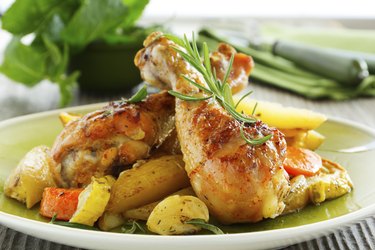
High-protein, low-calorie diets have been used as a tool for weight loss and people who want to increase lean body mass. It requires you to decrease your total amount of calories consumed per day but increase the ratio of protein that you normally eat in order to build muscle tissue. Understanding how your diet affects your ability to increase muscle and your health can help if you decide a high-protein, low-calorie diet is right for you.
High Protein Intake
Video of the Day
Registered dietitian Nancy Clark recommends about 0.4 grams of protein per pound of body weight for a sedentary adult. A recreational exerciser should increase that to about 0.5 to 0.7 grams per pound of body weight. When beginning a muscle-building exercise program you should increase the amount of protein to about 0.7 to 0.8 grams with the upper limit being 0.9 grams per pound of body weight. A typical ratio of macronutrients for this type of diet would be 40 percent carbohydrate, 30 percent protein and 30 percent fat, according to "Nancy Clark's Sports Nutrition Guidebook."
Video of the Day
Reducing Caloric Intake
Low-calorie diets are usually used as a way to decrease total body weight and/or body fat. Do not to cut your caloric intake too low as it can lower your metabolism and not give you the results you desire. Your body needs fuel in order to sustain itself, exercise and increase lean tissue. Determine how many calories you are eating to maintain your weight. Decrease the amount by 10 to 20 percent in order to lose body fat. This will create a caloric deficit and still fuel your body.
Food Choices
When trying to build muscle tissue, choose protein sources that are low in fat and provide the nutrition you need. Lean cuts of beef, poultry, fish and eggs are sources many bodybuilders utilize on a daily basis. Add a protein supplement to your diet as a method of increasing protein intake but not as your primary source. Protein supplements are often not complete foods and don't provide the nutrition of natural foods, according to bodybuilding.com.
Importance of Carbohydrates
Do not completely eliminate carbohydrates from your diet. Cut the total contribution of carbohydrates in your diet to increase your protein intake, but carbohydrates are a vital nutrient for health. Carbohydrates help fuel your body and are used in almost all metabolic processes, including muscle growth and repair. Choose sources with whole grains and fiber-rich foods. Avoid processed foods and high-sugar sources.
Warning
Use caution when beginning a high-protein diet. For most people, it is OK as long as you watch the saturated fat intake of the foods you choose. However, if you have digestion issues, you may be constipated or have diverticulitis, according to the Mayo Clinic. Incorporate fiber to help avoid this problem. If you have liver or kidney dysfunction, a high-protein diet may not be appropriate. Talk to your doctor about an alternative or dietary guidelines for protein intake.